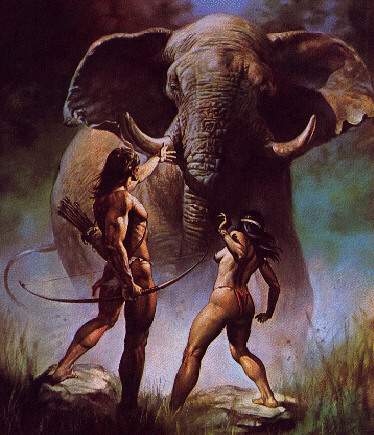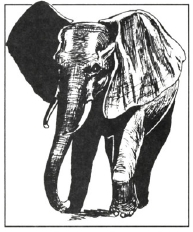Asia, Africa, Indra's Elephant.
The elephant is found only in warm climates.
They attack by means of a
stab with two tusks, a grab and squeeze with their trunk, and then two
tramplings with their front feet.
One opponent can be subject
to no more than two of these attacks at the same time but several opponents
can be fought simultaneously -- 6 or more man-sized opponents for example.
Ogre-sized opponents will
not be affected by trunk attacks.
Elephants are relatively intelligent,
and will not trunk-attack creatures which will harm their trunk, i.e. spikey,
hot, etc.
They fear fire.
An elephant can easily break
open a great gate by pushing unless the gate is spiked to prevent this.
They can be trained to carry
equipment and/or men.
Elephant tusks have a value
of 100 to 600 gold piece value each.
Each gold piece of value
equals one-quarter pound of weight.
<DMG:
ivory is worth 3-6 g.p. per pound>
Number Appearing: If
more than one-half the possible number is encountered, there will be young
animals in the herd -- from 1 to 4, 20% to 70% mature.
If a
single animal is encountered it will be a rogue bull, with no fewer than
6 hit points per die, and a very nasty and aggressive temper.
Rogues will attack 90% of
the time.
(See also the headings MAMMOTH and MASTODON for information on elephants.)
ENCOUNTER (only if NO. APPEARING
= 1): Rogues will attack 90% of the time.
The elephant is the sacred animal of Chih-Chiang Fyu-Ya and Indra.
Elephant (WSG):
A trained elephant (the only kind anyone should attempt
to ride or use) will generally respond
only to particular verbal
commands taught to it by the trainer; donít
buy an elephant
unless the command words are included in
the price.
An elephant can only be used in a climate
where the temperature
does not drop below 50 degrees, and it
will not travel up or
down a mountain or any severe slope. (Elephants
can negotiate
mountainous terrain, but only if a relatively
level pass exists be
tween the peaks.) If the beast is used
in an environment where it
can forage for itself along the way, it
will eat its fill of food (plants)
while traveling - but it will move 3Ē slower
when doing so. If food
and water are not readily available, an
elephant must be fed the
equivalent of fifty food rations and thirty
water rations each day to
maintain full strength. There is a 50%
chance every six hours that
an elephant forced to travel for more than
two days without getting
its full rations will bolt and head in
the direction where it believes
the nearest food and water sources to be.
Movement by Terrain (Unencumbered / Encumbered) <>
| Elephant | Normal Load | Maximum Load | Normal | Rugged | Very Rugged |
| Elephant, African | 500 | 1000 | 15 / 9 | 9 / 6 | 0 / 0 |
| Elephant, Asiatic | 500 | 1000 | 12 / 9 | 6 / 6 | 0 / 0 |
FIRE:
WEATHER:
NOISE:
ODOR:
OTHER:
(Asiatic) Elephant (Indra's Elephant)
<Africa or India. try to
find something a little more explicitly East
Indian, if possible>
<if you're just playing
with the MM, PH, DMG, go with something East Indian & riderless>
<if WSG, then try to incl.
an image with a rider>
<use the cover from the
Strategic Review, perhaps>
FREQUENCY: Common
FREQUENCY: Common
([Tropical Civilized Forest])
FREQUENCY: Uncommon
([Tropical Civilized Plains])
FREQUENCY: Rare
([Tropical Civilized Hills], [Tropical Civilized Swamp], [Tropical Civilized
Desert])
FREQUENCY: Common
([Tropical Wilderness Forest], [Tropical Wilderness Plains])
FREQUENCY: Rare
([Tropical Wilderness Hills], [Tropical Wilderness Swamp], [Tropical Wilderness
Desert])
NO. APPEARING: 1-20
ARMOR CLASS: 6
MOVE: 12"
HIT DICE: 10
% IN LAIR: Nil
TREASURE TYPE: Nil
NO. OF ATTACKS: 5 ~ 10
DAMAGE/ATTACK: 2-12,
2-12
(tusk, tusk) / 2-12 (trunk) / 2-12, 2-12 (foot, foot)
SPECIAL ATTACKS: Nil
SPECIAL DEFENSES: Nil
INTELLIGENCE: Semi-
ALIGNMENT: Neutral
SIZE: L (9' + tall)
LEVEL/X.P. VALUE:
VII | 1500 + 14
SAVES: 8.9.10.9.11

FREQUENCY: Common
FREQUENCY: Common
([Tropical Civilized Forest])
FREQUENCY: Uncommon
([Tropical Civilized Plains])
FREQUENCY: Rare
([Tropical Civilized Hills], [Tropical Civilized Swamp], [Tropical Civilized
Desert])
FREQUENCY: Common
([Tropical Wilderness Forest], [Tropical Wilderness Plains])
FREQUENCY: Rare
([Tropical Wilderness Hills], [Tropical Wilderness Swamp], [Tropical Wilderness
Desert])
NO. APPEARING: 1-12
ARMOR CLASS: 6
MOVE: 15"
HIT DICE: 11
% IN LAIR: Nil
TREASURE TYPE: Nil
NO. OF ATTACKS: 5 ~ 10
DAMAGE/ATTACK: 2-16,
2-16
(tusk, tusk) / 2-12 (trunk) / 2-12, 2-12 (foot, foot)
SPECIAL ATTACKS: Nil
SPECIAL DEFENSES: Nil
INTELLIGENCE: Semi-
ALIGNMENT: Neutral
SIZE: L (11' tall)
LEVEL/X.P. VALUE:
VII | 2125 + 16
SAVES: 7.8.9.8.10

Field Museum
![]()
Quote:
Originally posted by BOZ
right, i think you see what
i mean. i was first there in roughly 1988, and it looked like there was
a lot less stuff there last year.
edit: even the dinos seem to be a lot less impressive... but the taxidermy exhibit is awesome.

Boz, I still remember being
blown away as a little lad when entering the main hall of the Field Museum.
There before me were those
huge bull loxodonts locked in battle, while behind them were the bronze
stature of the Masai warriors readying their spears,
on another pedestal a lion
and lioness crouched and snarling,
and the third with the speared
lions and the warriors in jubilation,
one at least with shield
held overhead.
Right you are about the taxidermy
exhibits there.
That was where I spent most
of my time as a boy, looking at them.
We went to the museum about
once a month, with a side jaunt to either the Shedd
Aquarium or the Adler Planetarium.
Cheers,
Gary